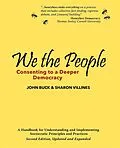We the People: Consenting to a Deeper Democracy
Our understanding of how the world works was fundamentally altered when the mechanical model of closed, linear systems was replaced with cybernetics and complexity theory. Sociocracy is a governance method that uses these new sciences to design organizations that are as powerful, self-organizing, and self-correcting as the natural world, including the honeybees.
The United States Declaration of Independence asserts that all human beings are created equally and endowed with the unquestionable rights of life, liberty, and the pursuit of happiness. In practice, however, these rights exist only for the majority, the rich, or property owners. We the People explains how sociocracy ensures these rights to everyone. Sociocracy shares the values of democracy, but designs more inclusive and efficient organizations. It makes profit-making businesses more profitable, and non-profit organizations more effective. And everyone happier.
The text includes history and theory; essential principles; relationship to traditional management theory; implementation methods; classic readings; examples of bylaws for businesses and nonprofits; short guides for meetings and decison-making; a glossary; bibliography; and index. It also includes photographs, diagrams, charts, and tables. It is a comprehensive handbook for understanding and implementing the sociocratic circle method of organization.
Autorentext
John Buck was the first native English-speaking consultant certified to teach and implement the Sociocratic Circle-Organization Method (SCM). After learning to read Dutch to study with Gerard Endenburg at the Sociocratisch Centrum in Rotterdam, he completed a master's degree in Quantitative Sociology at George Washington University. Using quantitative analysis to measure the effects of sociocracy on Dutch workers, he confirmed its effectiveness in increasing worker commitment and organizational productivity.
Buck has extensive experience in managing hundreds of workers in both government and corporate sectors in computer systems installation and management. He is a division director for the international organization, the Sociocracy Group, LLC. An expert in governance methods and organizational design, he serves on the boards of several organizations. The father of three children, he lives with his wife in Silver Spring, MD.
Inhalt
Notes on the Digital Edition About this Book About the Second Edition About the Authors Part I Revisiting Governance Governance and Science Management Theory & Governance 1. Why We Need Another "-ocracy" by John Buck 2. Why We Need Another "-ocracy" by Sharon Villines 3. The Idea of a Sociocracy Auguste Comte, Philosopher & Sociologist Lester Frank Ward, Rugged Individualist5 Cornelius Boeke & Beatrice Cadbury The First Sociocracy9 Gerard Endenburg, Inventor & Engineer Engineering Organizations 4. Cybernetics & Sociocracy The Science of Cybernetics The Uniqueness of Purpose in Cybernetics Second-Order Cybernetics What Is a Strong Organization? The First Principle: Consent The Second Principle: Circles The Third Principle: Double-Links Part II Rewiring Organizational Power 5. Inclusive Decision-Making Policy Decisions vs. Operations Decisions Power in Organizations Consent, Policy Decisions, Domains Objection, Not Veto Story of Sociocracy in Charles's Office 6. Developing Quality 5 Quality Control & Self-Organization Why Design Organizations This Way? 7. Steering & Structure Circular Processes Types of Steering Feedback and Feed-Forward Loops Static & Dynamic Steering Double-Linking & Dynamic Governance 8. New Leadership Strategies Electing Leaders Leadership as a Function of Work Deficiencies of the War Analogy The Strategic Planning Process 9. Free & Self-Optimizing Organizations Social Responsibility Communications Compensation as Measurement Investors & Investment Capital Planned Profit Distribution No Owners, No Slaves Part III Organizing Our Strengths The How To 10. Circles & Implementation 11. Rounds & the Consent Process Sara's Story: Consent Decision-Making to the Rescue 12. Assigning Roles & Responsibilities Using the Consent Process 13. Organizing Work by Producing Organization Defining the Aim Designing the Production Process The Steering Wheel: Leading and Measuring Vision, Mission, and Aim Examples 14. Money as Measurement The Sociocratic Compensation Structure Effects of the System Invitation to Share To Contact the Authors Sociocratic Centers & Resources Appendices: Additional Resources A. Sociocracy by Frank Ward B. Democracy as It Might Be by Kees Boeke C. Rationale for a New Social Design by Gerard Endenburg D. Sociocracy for One by Sharon Villines E. Sample Bylaws for a Sociocratic Business F. Bylaws for a Sociocratic Nonprofit Organization G. Guides to Organizing SociocraticallyGlossary Glossary Selected Bibliography
